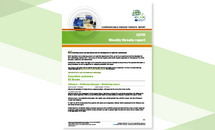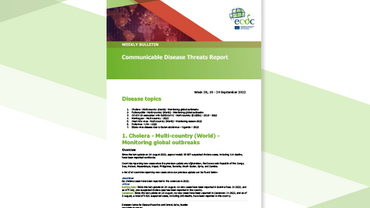Communicable disease threats report, 10-16 April 2016, week 15
The ECDC Communicable Disease Threats Report (CDTR) is a weekly bulletin for epidemiologists and health professionals on active public health threats. This issue covers the period 10-16 April 2016 and includes updates on Zika virus, Ebola virus disease, and yellow fever in Angola.
Executive summary
Migrant health
Following the request of the Greek authorities an ECDC senior expert has been in the field to review the risk assessment for communicable diseases on the basis of the current situation, to support the revision of the protocol for Point of Care public health surveillance for refugees and to advise on response procedures and priority settings. Two EPIET fellows were deployed to Greece on 13 April 2016 for one month to support communicable disease surveillance and response operations.
Refugees are currently not a threat to Europe with respect to communicable diseases, but they are a priority group for communicable disease prevention and control efforts as they are more vulnerable. The risk that refugees arriving in Europe will contract communicable diseases has increased because of the current overcrowding at reception facilities.
Seasonal influenza in Europe
In week 14/2016, influenza activity continued to decrease in the European Region. As is often seen late in the northern hemisphere’s influenza season, a shift towards circulation of type B influenza virus has occurred: 72% of detections in sentinel sources were type B in week 14/2016. The proportion of type B detections in hospitalised cases was 36-39%. The number of cases of severe disease reported were fewer than in previous weeks but varied between countries.
ECDC publishes joint weekly updates on seasonal influenza on Flu News Europe.
Zika virus infection
Based on a growing body of research, there is scientific consensus that Zika virus is a cause of microcephaly and GBS. The magnitude of the risk that Zika virus infection during pregnancy will result in malformations in the foetus is still under investigation but remains unknown at present.
Considering the growing body of evidence of adverse pregnancy outcomes associated with Zika virus infection, ECDC recommends that pregnant women postpone non-essential travel to Zika-affected areas. In addition, in order to protect pregnant women, male travellers returning from affected areas should consider using a condom with a pregnant partner until the end of pregnancy. On 11 April, WHO published an update of its travel health advice on Zika virus in which they advise travellers returning from areas with ongoing Zika virus transmission to practise safer sex for at least one month after returning, in order to reduce the potential risk of onward sexual transmission. This WHO guidance will be reviewed and the recommendations updated as new evidence emerges.
As of 5 April 2016, no autochthonous vector-borne Zika virus transmission has been reported in the continental EU.
Download






